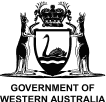Instrument used to measure sediment movement in Cockburn Sound. Photo credit: WAMSI.
Westport has partnered with the Western Australian Marine Science Institution (WAMSI) to deliver the $13.5 million WAMSI-Westport Marine Science Program. This 3-year program is developing the latest data, information and modelling on the complex environmental systems and community values associated with Cockburn Sound.
Project 4.4: Effects of total suspended solids on key fish species
Research Theme: Fisheries and aquatic resources
Researchers: E Harvey, K Schramm, B Saunders, C Wakefield, A Wenger, F Ackermann, S Newman
Publication date: February 2024
Why suspended sediment?
Dredging activities, used to support industrial, commercial and port operations, can result in sediment being ‘stirred up’ and suspended in the water.
Suspended sediment can impact marine life, for example, getting into the gills of fish, reducing light quality needed for marine life to thrive, and impacting habitat like seagrass.
Given the proposed new port facilities at Kwinana will require dredging to develop the port, this review sought to gather and document the existing knowledge on ecological and physiological suspended sediment thresholds for fish in Cockburn Sound. The review also considered inputs from a technical workshop in 2013 designed to review similar risks.
What the report found:
- There are 65 different fish species in Cockburn Sound that could be impacted by suspended sediment.
- Of these, 10 were of highest interest, including Pink Snapper, Blue Swimmer Crab, Southern Calamari, West Australian Salmon, King George Whiting, Australian Herring, West Australian Seahorse, Southern Garfish, Sandy Sprat and the Australian Sardine.
- Knowledge gaps were identified for certain species and locations that require further study.
What the report recommends:
- Further experimental work is proposed to address some of these knowledge gaps. This work has been commissioned as part of the WWMSP (Project 4.4) and is underway.
Westport will use the report recommendations to inform its dredging program the environmental management of the port construction. The intent is to employ best practice dredging management to protect and support marine health in Cockburn Sound.
You can read the full report here.





